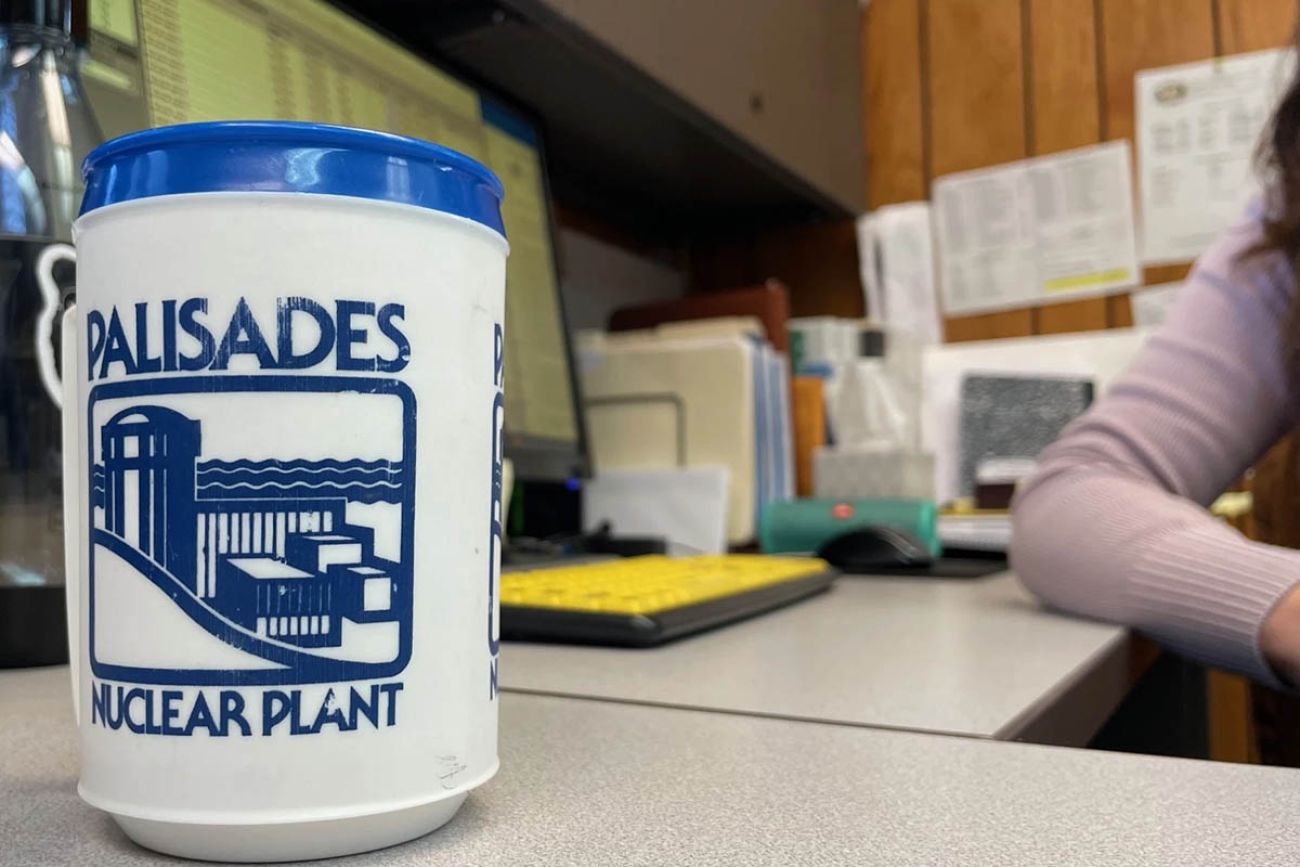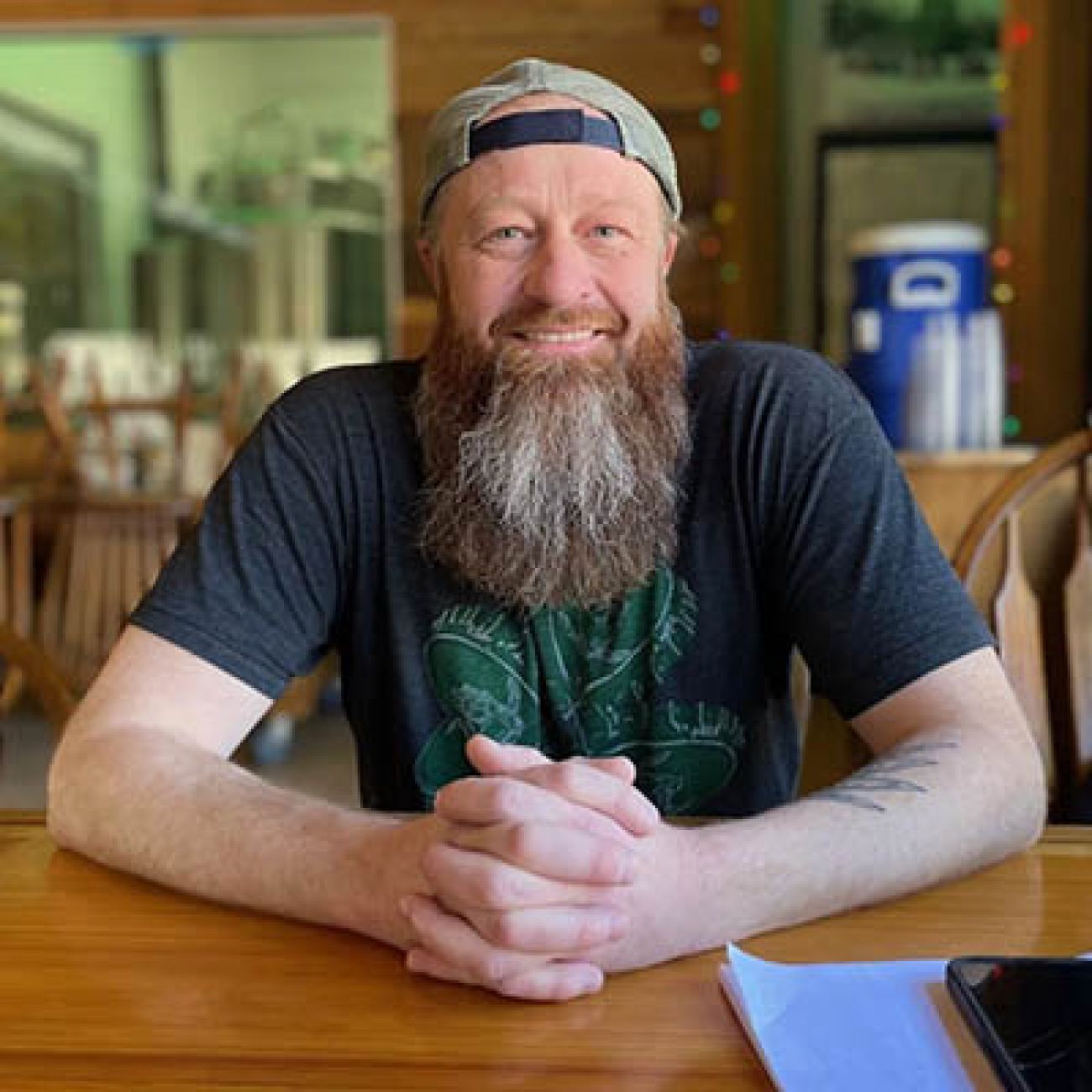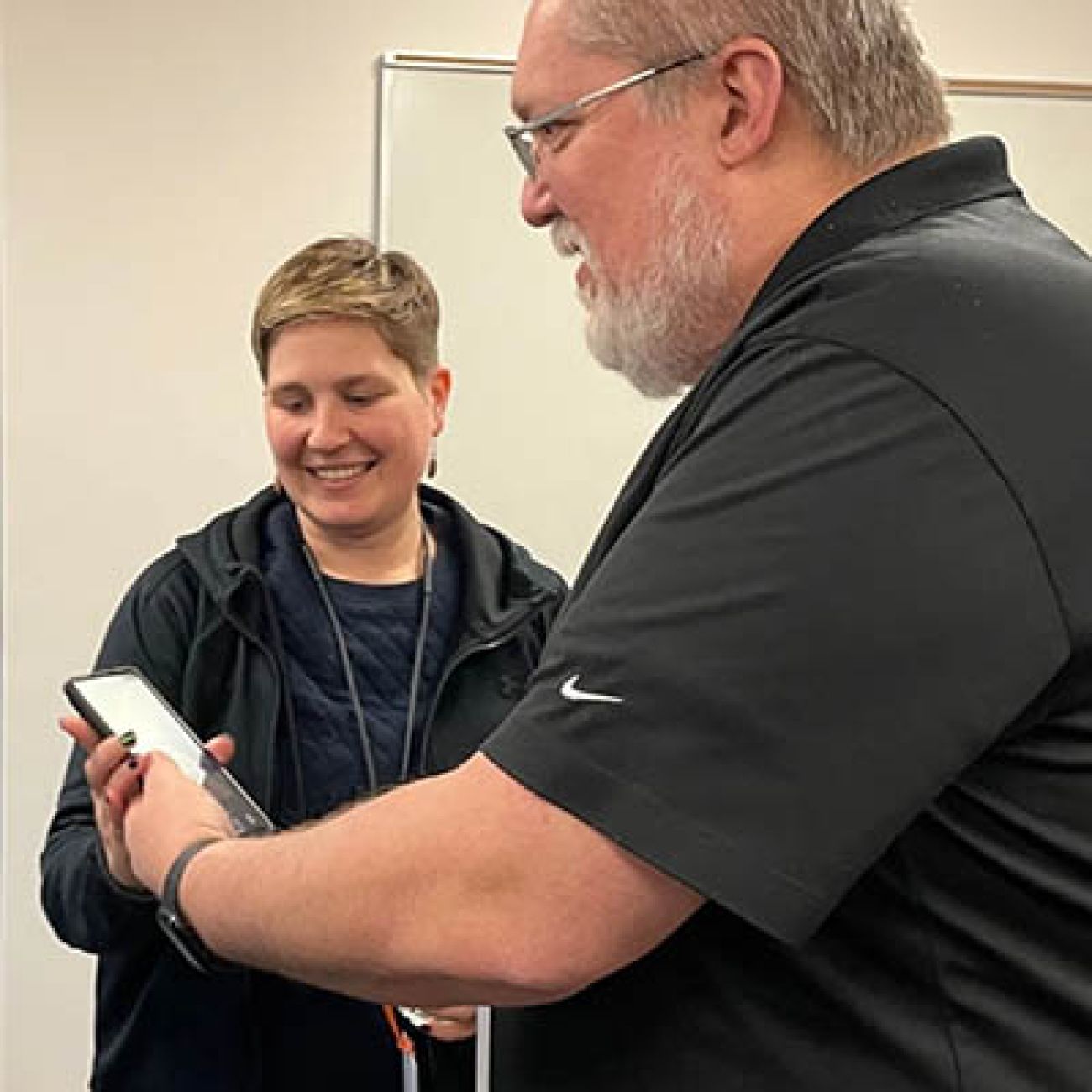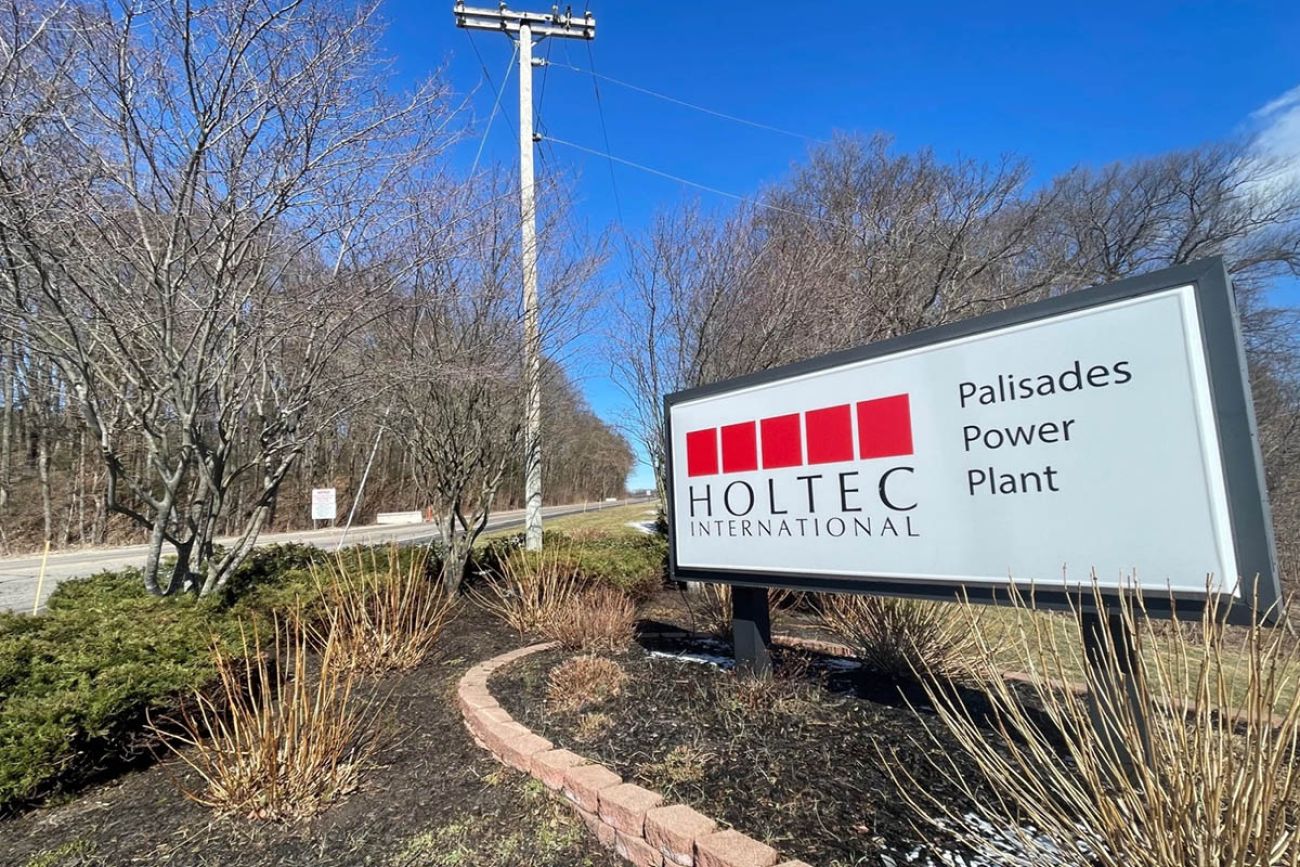Nuclear plant restart plan stirs hope, reunions in small Michigan town


- Biden administration loaning $1.5 billion to help restart Palisades nuclear plant
- Closure has hurt Covert Township economy, with projected losses topping $250 million
- About 600 workers were affected. Some relocated
Two years ago, standing in front of a bank of news cameras, Jim Byrd had an emotional moment.
“That's when reality hit that I was about to lose my work family,” Byrd said. “Things were about to change.”
The Palisades Nuclear Plant, where he’d spent 25 years of his life as a control room operator and trainer, was closing. About 600 workers were affected. Some would stay on to help decommission the plant. Many would retire. The rest, if they wanted to keep a job in nuclear energy, would have to relocate.
Byrd was among those relocating to a nuclear facility in Mississippi. For him, leaving Palisades was about more than leaving a job.
Great Lakes News Collaborative
Bridge Michigan, Circle of Blue, Great Lakes Now at Detroit Public Television, Michigan Public and The Narwhal work together to report on the most pressing threats to the Great Lakes region’s water. This independent journalism is supported by the Charles Stewart Mott Foundation.
“The only thing I can say is family,” Byrd said in a drawl he picked up before his Mississipi days, growing up in Southwestern Indiana. “That's what this feels like. Because you spend more time with these — especially during refueling outages — these individuals here than what you do with your immediate family.”
Related:
- Feds award $1.5 billion for Palisades nuclear plant restart
- Report: Feds will give $1.5 billion to restart Palisades nuclear plant
- Michigan company agrees to buy nuclear power from shuttered Palisades plant
Losing that work family was emotional, and hard, Byrd said.
But that’s not all it was. It was also about a whole lot of money getting sucked right out of southwest Michigan.
The University of Michigan published a report on the expected impact of closing Palisades. When they added it all up, researchers estimated the total from lost tax revenue, lost salaries, and lost sales to local businesses would cost the area economy more than $250 million.
Nostalgia for nuclear
No place stood to lose more than Covert Township, where Palisades is located, tucked in between sand dunes on the Lake Michigan shoreline.
Daywi Cook is supervisor of the township. On her desk sits a vintage plastic Palisades coffee mug that Cook got from her dad. He got it because he was one of the workers who helped build the plant in the late 1960s. His family, she said, has been in Covert Township for generations.
She grew up all over, thanks to her dad’s job. But for her Covert has always been home and Palisades has always been a part of it. Even thinking of the test sirens that used to blare across the township brings a sense of nostalgia.
“I remember swinging outside and listening to them, and it was just a normal thing. And the dogs would howl,” Cook said in her office at the township hall. “Not everybody has those sort of nostalgic memories linked around nuclear.”
But for many in the township, Palisades brought more than nostalgia. It also brought a whole lot of money.
Cook says when the Palisades closure was first announced, the taxes from the plant made up 40% of all of the township’s revenues.
It was money that helped Covert operate differently than other small towns. It didn’t have to take on as much debt. It didn’t have to apply for federal grants. In 2016, when the township built a new headquarters for the police and fire department, it had enough money in reserves to essentially pay cash, Cook said.
Closing Palisades changed that.
“It changed the way in which we got funding for projects, and it forced us to collaborate with others, which was another very important thing that was not happening in the past,” Cook said. “And a lot of that, I do think, is due to the fact that we were flush with money.”
Cook said the township has fared well since the closure, thanks to its new approach to financing projects and some key grants from the state and federal government.
Organizing businesses for life after Palisades
Even for businesses in the area, the impact of the plant closing wasn’t what a lot of people had feared it would be.

Joe Morin and his family own Sister Lakes Brewing, in a small town about 30 minutes drive inland from Palisades.
“There's a lot of communities that have larger corporations that they just lean on and assume are always going to be there,” Morin said. “Well, what happens if they're not?”
That was the question on a lot of business owners’ minds when the Palisades closure was first announced in 2017. But by 2022 when the plant actually stopped operating, Sister Lakes Brewing was recovering from the pandemic.
“Right out of the gates, out of pandemic situation, people were just ready to spend money and go out,” Morin said. “And we saw a really nice spike.”
But the spike didn’t last. Prices kept rising. The flood of customers eager to go out after the pandemic ebbed.
That’s when Morin and a group of other craft beverage makers in the area connected with researchers at the Economic Growth Institute at the University of Michigan. They formed a marketing plan to promote their businesses as a group. This spring they’re launching The Brew Belt Byway, a new guide to craft-made beer, cider and mead in Van Buren County. The guide comes with a map and a punch card for each business on the map. Customers who get more than six punches are entered for a chance at a $250 gift certificate.
Morin says the collaboration has been important because in Van Buren County, where Palisades is located, there are still floods of tourists who come through to spend money in the beach towns along Lake Michigan. But the businesses in the smaller communities inland, like Sister Lakes Brewing, don’t always get as much attention.
“So it kind of highlights the county as a whole and it makes people realize that if you’re in South Haven, that, oh my, it’s more than just South Haven, or if you’re in Bangor, there’s more than just Bangor and Paw Paw,” Morin said. “It’s a big county.”
The unlikely twist
This is usually where the story of a big plant closure ends. The jobs go away. Workers feel the pain. The community recalibrates to the new reality.
But with the Palisades closure, there’s a new twist. Now, the company that bought Palisades to tear it down is trying to reopen the plant instead.
It’s something that’s never happened before to a shuttered nuclear facility. The company will need to prove to federal regulators that it can reopen the plant safely. But the possibility for reopening is strong enough that workers have begun to flood back to the plant to prepare.
That includes Jim Byrd, who moved back earlier this year to train operators in the plant’s control room simulator. He’s also been reconnecting with his Palisades family. The family has grown since he was last here.
“She is gorgeous,” the bearded Byrd coos over a photo of a coworker’s new baby. “Look at that smile!”
Standing next to Byrd, showing off the photos on her phone, is Erica Boyer, a procurement supervisor at the plant who relocated along with her husband when Palisades closed in 2022. Now, Boyer is back, working at the plant and living in Paw Paw.

“We had a little baby girl while we were down in Mississippi,” Boyer said. “She's eight months old now, and that was a big decider in us coming back as well. We wanted to be closer to our families and have our daughter go to Paw Paw schools. So we're excited about that.”
Boyer didn't hate her time at the facility in Mississippi. She embraced the use of “y’all” and said she’s never giving it up. But still, she said, it’s good to be home.
“I like the South. It was a lot of really good people, a lot of really good food,” Boyer said. “But it was — it was too hot.”
Reopening a shuttered nuclear plant brings a set of challenges that no team has gone through before. And not everyone in Michigan is totally juiced about trying this new thing right on the shore of one of the world’s largest sources of surface freshwater.
The company will need to upgrade the 50-year-old plant and prove to federal regulators it can reopen and operate safely.
But there are an awful lot of people pulling for it. They believe nuclear power is a better option for the planet than burning coal or natural gas.

The Biden administration is loaning $1.5 billion in federal dollars to make it happen. Michigan has committed $150 million and Governor Gretchen Whitmer has recommended another $150 million in the upcoming budget.
It’s a lot of money. A lot of effort.
Reopening the plant is still not a done deal. But if it happens, it will be a huge deal.
For this community. For Erica Boyer. And for all of Jim Byrd’s work family.
Michigan Environment Watch
Michigan Environment Watch examines how public policy, industry, and other factors interact with the state’s trove of natural resources.
- See full coverage
- Subscribe
- Share tips and questions with Bridge environment reporter Kelly House
Michigan Environment Watch is made possible by generous financial support from:
Our generous Environment Watch underwriters encourage Bridge Michigan readers to also support civic journalism by becoming Bridge members. Please consider joining today.
See what new members are saying about why they donated to Bridge Michigan:
- “In order for this information to be accurate and unbiased it must be underwritten by its readers, not by special interests.” - Larry S.
- “Not many other media sources report on the topics Bridge does.” - Susan B.
- “Your journalism is outstanding and rare these days.” - Mark S.
If you want to ensure the future of nonpartisan, nonprofit Michigan journalism, please become a member today. You, too, will be asked why you donated and maybe we'll feature your quote next time!




